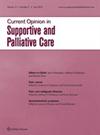Is there a role for capsaicin in Cancer pain management?
IF 2
4区 医学
Q3 HEALTH CARE SCIENCES & SERVICES
Current Opinion in Supportive and Palliative Care
Pub Date : 2024-09-12
DOI:10.1097/spc.0000000000000718
引用次数: 0
Abstract
PURPOSE OF REVIEW Advances in oncological therapies have resulted in an increase in the number of patients living with and beyond cancer. The personal and societal impact of chronic pain in the survivor population represents an area of significant unmet need. Capsaicin (a TRPV1 agonist) may provide analgesia with limited systemic side effects. This review looks to summarise the most recent evidence regarding the use of capsaicin in the management of cancer pain. RECENT FINDINGS Various international guidelines have recently endorsed the use of high concentration capsaicin patches in the treatment of chronic painful chemotherapy induced peripheral neuropathy. Numerous studies support the use of capsaicin in the treatment of peripheral neuropathic pain. This promising data is predominantly yielded from pain secondary to herpes zoster and diabetic neuropathy, with an expanding but small evidence base for its utility in other neuropathic pains. Emerging data suggests that treatments are better tolerated and provide analgesia more rapidly when compared with systemic treatments. SUMMARY Whilst randomised controlled trial data in the treatment of cancer pain are lacking, recent large cohort studies, and international guidelines, support the use of high concentration capsaicin patches in a wide variety of neuropathic pain secondary to cancer treatments.辣椒素在癌症疼痛治疗中能发挥作用吗?
综述目的 肿瘤疗法的发展导致癌症患者及癌症后患者人数的增加。幸存者群体中的慢性疼痛对个人和社会的影响是一个尚未得到满足的重大需求领域。辣椒素(一种 TRPV1 激动剂)可提供镇痛效果,且全身副作用有限。本综述旨在总结有关使用辣椒素治疗癌症疼痛的最新证据。最新发现最近,各种国际指南都认可使用高浓度辣椒素贴片来治疗化疗引起的慢性疼痛性周围神经病变。许多研究都支持使用辣椒素治疗外周神经病理性疼痛。这些充满希望的数据主要来自继发于带状疱疹和糖尿病神经病变的疼痛,其在其他神经病理性疼痛中的效用的证据基础正在不断扩大,但规模很小。总结虽然缺乏治疗癌症疼痛的随机对照试验数据,但最近的大型队列研究和国际指南都支持将高浓度辣椒素贴片用于治疗癌症继发的各种神经病理性疼痛。
本文章由计算机程序翻译,如有差异,请以英文原文为准。
求助全文
约1分钟内获得全文
求助全文
来源期刊

Current Opinion in Supportive and Palliative Care
HEALTH CARE SCIENCES & SERVICES-
CiteScore
3.70
自引率
0.00%
发文量
54
期刊介绍:
A reader-friendly resource, Current Opinion in Supportive and Palliative Care provides an up-to-date account of the most important advances in the field of supportive and palliative care. Each issue contains either two or three sections delivering a diverse and comprehensive coverage of all the key issues, including end-of-life management, gastrointestinal systems and respiratory problems. Current Opinion in Supportive and Palliative Care is an indispensable journal for the busy clinician, researcher or student.
 求助内容:
求助内容: 应助结果提醒方式:
应助结果提醒方式:


